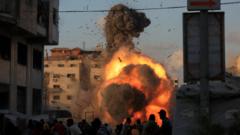Are Palestinian Prisoners Receiving Enough Food According to Israel's Top Court?

Published: 2025-09-08 03:54:04 | Category: world
Israel's Supreme Court has mandated the state to improve food provisions for Palestinian prisoners, asserting that it is a legal obligation to ensure their basic nutritional needs are met. This ruling comes amid ongoing unrest in Gaza and heightened international scrutiny of Israel's treatment of detainees. Notably, US President Donald Trump has issued a stark warning to Hamas regarding negotiations for the release of Israeli hostages, further complicating the landscape of the ongoing conflict.
Last updated: 06 November 2023 (BST)
Key Takeaways
- The Israeli Supreme Court ruled that the state must improve nutrition for Palestinian prisoners.
- US President Donald Trump warned Hamas to accept a ceasefire deal for hostages.
- Intensified military operations in Gaza continue despite growing calls for a ceasefire.
- Human rights groups have highlighted substandard prison conditions and mistreatment of detainees.
- Israel has faced international criticism for its military actions and treatment of prisoners.
Overview of the Court Ruling
The recent ruling by Israel's Supreme Court underscores a critical legal obligation: the state must provide sufficient nutrition to Palestinian prisoners. The three-judge panel highlighted that the current provisions were inadequate to ensure a "basic level of existence" for those incarcerated. This decision is particularly significant, given the backdrop of ongoing conflict and the high number of Palestinian detainees in Israeli prisons.
The Context of Palestinian Detention
Thousands of Palestinians are currently held in Israeli jails, many facing charges related to terrorism. Since the escalation of violence in October 2023, following the war that erupted after the Hamas attack, the number of detainees has surged. The treatment of these prisoners has drawn the ire of human rights advocates and organisations, who argue that the conditions violate basic human rights standards.
International Reactions and the Hostage Situation
As the situation unfolds, international pressure on Israel has intensified. President Trump’s recent statements indicate a strong push for negotiations with Hamas to secure the release of Israeli hostages. He described the current moment as a "last warning" to Hamas, suggesting that there is an imminent opportunity for a ceasefire agreement. His comments were made on the social media platform Truth Social, where he expressed optimism about a potential deal.
Current Status of Hostages
Among the 48 hostages believed to be held in Gaza, reports suggest that as many as 20 may still be alive. This precarious situation adds urgency to the negotiations, with the Israeli government previously stating that the return of all hostages is a non-negotiable condition. The complexity of these negotiations is further compounded by the Israeli government’s stance that military action will continue until Hamas is decisively defeated.
Public Sentiment and Protests in Israel
Domestically, Prime Minister Benjamin Netanyahu faces mounting pressure. Recent protests in Israel have seen thousands taking to the streets, demanding an end to the offensive in Gaza and urging a resolution to the hostage crisis. This public dissent reflects a growing frustration with the prolonged conflict and the humanitarian toll it has taken on both sides.
Israeli Military Actions in Gaza
Despite international calls for restraint, the Israeli Defence Forces (IDF) have intensified their military operations in Gaza. Over the weekend, the IDF targeted multiple high-rise buildings that it claimed were being used by Hamas for military purposes. This included the Al-Roya Building, which the IDF alleged housed intelligence-gathering equipment. However, these claims have been met with denials from Palestinian authorities, who assert that such actions are unjustifiable attacks on civilians.
Human Rights Concerns and Prison Conditions
Human rights organisations, including the Association for Civil Rights in Israel (ACRI), have long raised alarms regarding the treatment of Palestinian prisoners. They argue that recent changes in food policies have exacerbated issues of malnutrition and starvation among detainees. The Supreme Court's ruling on improved nutritional standards is seen as a step towards addressing these concerns, although the implementation and enforcement of this ruling remain to be seen.
International Committee of the Red Cross (ICRC) Access Denial
Compounding the situation is Israel's refusal to grant the International Committee of the Red Cross (ICRC) access to Palestinian detainees since the outset of the recent conflict. This denial raises additional human rights concerns, particularly regarding the treatment and welfare of those held under harsh conditions.
The Broader Implications of the Conflict
The ongoing conflict in Gaza has led to significant civilian casualties, with reports indicating that over 64,000 Palestinians have lost their lives since the start of the Israeli military campaign. The United Nations has deemed these figures credible, although Israel disputes the accuracy of such claims. The high casualty rate underscores the urgent need for a resolution to the conflict, not only for humanitarian reasons but also for regional stability.
What Lies Ahead?
As the conflict continues, the situation remains fluid. Negotiations for a ceasefire and the release of hostages are ongoing but fraught with challenges. The international community is watching closely, with many advocating for a diplomatic resolution that addresses the humanitarian needs of both Palestinians and Israelis. The coming weeks will be crucial in determining the future trajectory of the conflict and the potential for peace.
FAQs
What did the Israeli Supreme Court rule regarding Palestinian prisoners?
The Israeli Supreme Court ruled that the state must improve food provisions for Palestinian prisoners, ensuring they receive adequate nutrition to meet a basic level of existence.
What is the status of the hostages held by Hamas?
Currently, 48 hostages remain in Gaza, with reports suggesting that up to 20 are still believed to be alive. Negotiations for their release are ongoing.
What impact has the conflict had on civilian casualties in Gaza?
According to reports from health officials, over 64,000 Palestinians have died since the start of the Israeli military campaign in Gaza, highlighting the severe humanitarian impact of the conflict.
Why have protests erupted in Israel?
Protests in Israel have erupted due to public frustration with the ongoing conflict in Gaza and the government's handling of the hostage situation, with many calling for an end to military operations.
How have human rights organisations responded to prison conditions?
Human rights organisations have condemned the treatment of Palestinian prisoners, highlighting issues such as malnutrition and the lack of access for the International Committee of the Red Cross.
As the situation in Gaza continues to develop, the international community remains watchful. The urgency for a diplomatic solution grows, reflecting the complex web of humanitarian, political, and security concerns that must be addressed. Will there be a shift towards peace, or will the cycle of violence persist? #GazaConflict #HumanRights #Ceasefire



